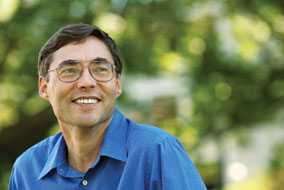
Nobel laureate Carl E. Wieman - photo by Martin Dee UBC Reports | Vol. 52 | No. 8 | Aug. 3, 2006
Innovations in Teaching and Learning
Teaching and Learning at UBC are Undergoing Something of a Renaissance. At This Rate, Where Will We Be in 10 Years?
Carl Wieman’s research gained him the Nobel Prize for Physics in 2001. But he’s joining UBC’s Faculty of Science not to delve into the mysteries of atoms but into the minds of students and teachers in a quest to reform the teaching of science. Below are excerpts from an interview with UBC Reports.
The most important issue that has brought me to UBC is the tremendous interest here in improving education, particularly science education for undergraduates. There are faculty and administrators very interested in this, and they are willing to invest the time and money to do it. I thought UBC was an institution where I could develop a lot of my ideas about ways to use a scientific approach to make a better education for students.
Looking around for opportunities to make big impact has worked through my whole physics career; I’ve been pretty good at picking the right places to work. Even before I won the Nobel Prize, I was very interested in the teaching of science; afterward I gradually became even more interested. I had done a lot in physics, but it was clear that, although there were still interesting things still to be done, they weren’t going to have the impact of what I’d already done; whereas I saw in education these tremendous opportunities.
How to reform the teaching of sciences, and why to do it, has come about because of research in cognitive science — how people think and learn — that’s developed over the last 10 to 20 years. From that information we’ve come to realize that what most students were learning was not at all what we hoped they were learning; they weren’t learning to think about it and use science like scientists.
And at the same time that this research told us there was a problem, it also told us better ways to help students to gain that understanding. Our understanding of how people learn, and approaches in education such as the use of technology, offers the hope of some revolutionary improvements in education for all students, whether they’re going into science or anything else.
When I try to look ahead 10 years from now, I hope these efforts in science education that we accomplish at UBC will become a model for all universities across the world, and then ultimately down into the high schools as a new form for educating students.
The students who will come out of that, regardless of what they choose for careers — whether they’re scientists or doctors or lawyers or farmers — will have a much better understanding of science and how it can be useful in their life.
They’ll understand the world around them better, be able to make better decisions on these issues about choosing what energy sources to use, to how to insulate their house and they’ll just be more scientifically literate citizens. And that will improve their lives. |
